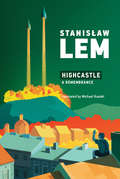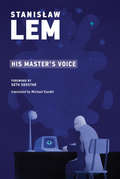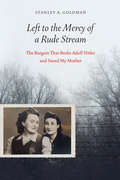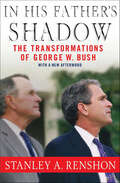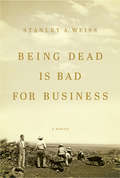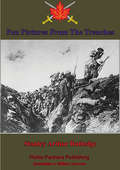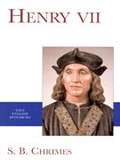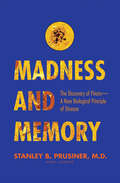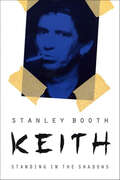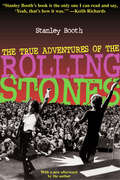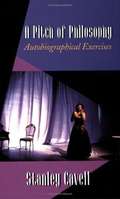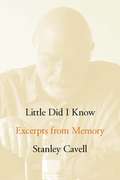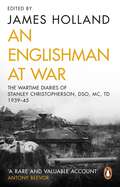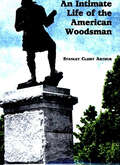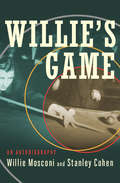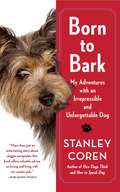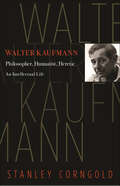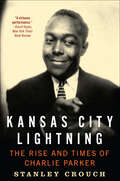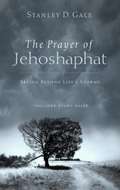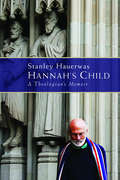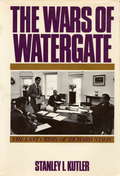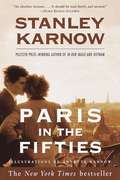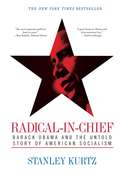- Table View
- List View
Highcastle: A Remembrance
by Stanislaw LemA playful, witty, reflective memoir of childhood by the science fiction master Stanisław Lem. With Highcastle, Stanisław Lem offers a memoir of his childhood and youth in prewar Lvov. Reflective, artful, witty, playful—“I was a monster,” he observes ruefully—this lively and charming book describes a youth spent reading voraciously (he was especially interested in medical texts and French novels), smashing toys, eating pastries, and being terrorized by insects. Often lonely, the young Lem believed that he could communicate with household objects—perhaps anticipating the sentient machines in the adult Lem's novels. Lem reveals his younger self to be a dreamer, driven by an unbridled imagination and boundless curiosity. In the course of his reminiscing, Lem also ponders the nature of memory, innocence, and the imagination. Highcastle (the title refers to a nearby ruin) offers the portrait of a writer in his formative years.
His Master's Voice
by Stanislaw LemScientists attempt to decode what may be a message from intelligent beings in outer space. By pure chance, scientists detect a signal from space that may be communication from rational beings. How can people of Earth understand this message, knowing nothing about the senders—even whether or not they exist? Written as the memoir of a mathematician who participates in the government project (code name: His Master's Voice) attempting to decode what seems to be a message from outer space, this classic novel shows scientists grappling with fundamental questions about the nature of reality, the confines of knowledge, the limitations of the human mind, and the ethics of military-sponsored scientific research.
Left to the Mercy of a Rude Stream: The Bargain That Broke Adolf Hitler and Saved My Mother
by Stanley A. GoldmanSeven years after the death of his mother, Malka, Stanley A. Goldman traveled to Israel to visit her best friend during the Holocaust. The best friend’s daughter showed Goldman a pamphlet she had acquired from the Israeli Holocaust Museum that documented activities of one man’s negotiations with the Nazi’s interior minister and SS head, Heinrich Himmler, for the release of the Jewish women from the concentration camp at Ravensbrück. While looking through the pamphlet, the two discovered a picture that could have been their mothers being released from the camp. Wanting to know the details of how they were saved, Goldman set out on a long and difficult path to unravel the mystery. After years of researching the pamphlet, Goldman learned that a German Jew named Norbert Masur made a treacherous journey from the safety of Sweden back into the war zone in order to secure the release of the Jewish women imprisoned at the Ravensbrück concentration camp. Masur not only succeeded in his mission against all odds but he contributed to the downfall of the Nazi hierarchy itself. This amazing, little-known story uncovers a piece of history about the undermining of the Nazi regime, the women of the Holocaust, and the strained but loving relationship between a survivor and her son.
In His Father's Shadow: The Transformations of George W. Bush
by Stanley A. RenshonFrom a pampered son who showed little promise, to his rise to the presidency, George W. Bush has transformed himself through acts of will and faith. Stanley Renshon examines the psychological transformation of Bush and identifies those pivotal changes that allowed him to achieve success in his personal life and in the political arena, and shows how Bush's personal transformation has come to shape his political policies. The man who battled--and defeated--his own inner demons has become a president determined to battle the demons of terrorism and extremism that prevent democracy from flourishing around the world. This psychological portrait provides a much-needed antidote to prevailing critiques that ridicule Bush's values and policies, as it celebrates his resolve and strong leadership.
Being Dead Is Bad for Business: A Memoir
by Stanley A. WeissMost of us spend our lives talking ourselves out of things. But what could you accomplish if you never held yourself back?What if, despite your fears, you went for broke every time? You might live a life as extraordinary as the one Stanley Weiss has lived for nearly a century.A skinny Jewish kid from Philadelphia training to fight and likely die in the U.S. invasion of Japan in 1945, Stanley Weiss came home to the death of his loving but weak father, who left his mother penniless. Inspired by a Humphrey Bogart movie, Weiss moved to a foreign country to hunt for treasure—where Rule Number One was ''Don't Die.'' Along the way, his zest for living has taken him from the company of legendary artists and poets in Mexico, to writers and beatniks in 1960s San Francisco and Hollywood; from drunken nights with a notorious spy to friendships with three of the men who played James Bond; from glamorous parties in Gstaad and Phuket to power politics in London and Washington, DC. For those who believe the world is shaped by ordinary people who push themselves to do extraordinary things, Stanley Weiss's story will inspire and surprise while reminding us all that being dead is bad for business—and being boring is bad for life.
Pen Pictures From The Trenches
by Stanley Arthur RutledgeStanley Arthur Rutledge was a man of many parts: lawyer, beloved son, soldier, man of letters before his life was cut tragically short on the 16th November 1917. A member of the famed Canadian Corps, he left his home shore in 1915 and served courageously until dying in a flying accident whilst trained for the Royal Flying Corps.This volume is divided into two parts: the first contains notes, anecdotes and experiences that the Author wrote whilst in the trenches through the battles of the Western Front, including the Somme. In them he describes the daily shelling, sniper fire, deadly poison gas, going over the top and even a sentry shooting one of his own officers who didn't hear his challenge. The second part is made up of his letters home to his parents in Canada describing his experiences in the "Hippodrome of Hell" of the war. In spite of his audience, he pulled no punches in his retellings...An excellent First World War Memoir.Author -- Stanley Arthur Rutledge d. 1917Text taken, whole and complete, from the edition published in Toronto, William Briggs, 1918.Original Page Count - 159 pages.
Henry VII
by Stanley B. ChrimesFounder of the Tudor dynasty, Henry VII was a crucial figure in English history. In this acclaimed study of the king's life & reign, the distinguished historian S. B. Chrimes explores the circumstances surrounding Henry's acquisition of the throne, examines the personnel & machinery of government, & surveys the king's social, political, & economic policies, law enforcement, & foreign strategy. This edition of the book includes a new critical introduction & bibliographical updating by George Bernard.
Madness and Memory: The Discovery of Prions—A New Biological Principle of Disease
by Stanley B. PrusinerIn this &“utterly fascinating&” science memoir, the Nobel Prize–winning author chronicles his revolutionary discovery of a major cause of brain diseases (The New York Times). In 1997, Stanley B. Prusiner received the Nobel Prize in Physiology or Medicine for his research on devastating brain diseases. That he was the award&’s sole recipient was entirely appropriate. His struggle to identify the agent responsible for scrapie and mad cow disease in animals, and Creutzfeldt-Jakob disease in humans, had been waged largely alone, and in some cases, in the face of strenuous opposition. In Madness and Memory, Prusiner recounts the journey to his remarkable discovery of prions—infectious proteins that replicate and cause disease, but surprisingly contain no genetic material. Along the way, he sheds light on the world of contemporary science and the meticulousness and perseverance it requires. Through his telling, the agony and triumph of years of research comes to life, along with fascinating portraits of fellow scientists racing to make breakthrough discoveries. Prusiner&’s hypothesis, once considered heresy, now stands as accepted science and provides a path toward conquering such pervasive scourges as Alzheimer&’s, Parkinson&’s, Lou Gehrig&’s, and others diseases. &“Madness and Memory is the story of one of the most important discoveries in recent medical history, and it is also a vivid and compelling portrait of a life in science.&” —Oliver Sacks, MD, neurologist and author of Hallucinations
Keith: Standing in the Shadows
by Stanley BoothKeith is the biography of Keith Richards, written by one of his old friends, Stanley Booth. Drawing on extensive, in-depth interviews, the book explores Richards' relationship with Mick Jagger and the Stones, his views on his evolving craft, his experiences in the London music scene, and much more. Keith offers a personal study of the Rolling Stones legend, an "intimate portrait of one of the great molders of contemporary pop music" (Booklist).
The True Adventures of Rolling Stones
by Stanley BoothStanley Booth, a member of the Rolling Stones' inner circle, met the band just a few months before Brian Jones drowned in a swimming pool in 1968. He lived with them throughout their 1969 American tour, staying up all night together listening to blues, talking about music, ingesting drugs, and consorting with groupies. His thrilling account culminates with their final concert at Altamont Speedway--a nightmare of beating, stabbing, and killing that would signal the end of a generation's dreams of peace and freedom. But while this book renders in fine detail the entire history of the Stones, paying special attention to the tragedy of Brian Jones, it is about much more than a writer and a rock band. It has been called--by Harold Brodkey and Robert Stone, among others--the best book ever written about the sixties. In Booth's new afterword, he finally explains why it took him 15 years to write the book, relating an astonishing story of drugs, jails, and disasters.
A Pitch of Philosophy: Autobiographical Exercises
by Stanley CavellThis book is an invitation to the life of philosophy in the United States, as Emerson once lived it and as Stanley Cavell now lives it--in all its topographical ambiguity.
Little Did I Know
by Stanley CavellAn autobiography in the form of a philosophical diary, Little Did I Know's underlying motive is to describe the events of a life that produced the kind of writing associated with Stanley Cavell's name. Cavell recounts his journey from early childhood in Atlanta, Georgia, through musical studies at UC Berkeley and Julliard, his subsequent veering off into philosophy at UCLA, his Ph.D. studies at Harvard, and his half century of teaching. Influential people from various fields figure prominently or in passing over the course of this memoir. J.L. Austin, Ernest Bloch, Roger Sessions, Thomas Kuhn, Robert Lowell, Rogers Albritton, Seymour Shifrin, John Rawls, Bernard Williams, W. V. O. Quine, and Jacques Derrida are no longer with us; but Cavell also pays homage to the living: Michael Fried, John Harbison, Rose Mary Harbison, Kurt Fischer, Milton Babbitt, Thompson Clarke, John Hollander, Hilary Putnam, Sandra Laugier, Belle Randall, and Terrence Malick. The drift of his narrative also registers the decisiveness of the relatively unknown and the purely accidental. Cavell's life has produced a trail of some eighteen published books that range from treatments of individual writers like Wittgenstein, Austin, Emerson, Thoreau, Heidegger, Shakespeare, and Beckett to studies in aesthetics, epistemology, moral and political philosophy, cinema, opera, and religion.
An Englishman at War: The Wartime Diaries of Stanley Christopherson DSO MC & Bar 1939-1945
by Stanley Christopherson‘An astonishing record...There is no other wartime diary that can match the scope of these diaries’ James Holland‘An outstanding contribution to the literature of the Second World War’Professor Gary SheffieldFrom the outbreak of war in September 1939 to the smouldering ruins of Berlin in 1945, via Tobruk, El Alamein, D-Day and the crossing of the Rhine, An Englishman at War is a unique first-person account of the Second World War. Stanley Christopherson’s regiment, the Sherwood Rangers Yeomanry, went to war as amateurs and ended up one of the most experienced, highly trained and most valued armoured units in the British Army. A junior officer at the beginning of the war, Christopherson became the commanding officer of the regiment soon after the D-Day landings. What he and his regiment witnessed presents a unique overview of one of the most cataclysmic events in world history and gives an extraordinary insight, through tragedy and triumph, into what it felt like to be part of the push for victory.
Audubon: An Intimate Life of the American Woodsman
by Stanley Clisby Arthur&“In recreating The American Woodsman, as Audubon so delighted to characterize himself, it is with the hope that I shall let him speak for himself, and set him wandering again in the printed pages as he did, a century and more ago, through the magnolia forests of his beloved Louisiana.&” —Stanley Clisby Arthur, from the Prologue John James Audubon was one of the greatest artists and naturalists of all time. For many years a biographical screen consisting of a heterogeneous combination of fact, fancy, and misrepresentation obscured the real Audubon. Some of the contributions to this shroud were penned by loving but misguided relatives who, through domestic partiality when writing about him, colored his life misleadingly. His own account of himself and his affairs, which was never completed and was generously edited before being given to the public, is manifestly not four-square with fact . . . for Audubon had a romantic imagination which defeats verification. This detailed biography provides an extensive look into the background of a man variously described as a dandy, an unkempt wanderer, and a gifted artist. Above all, it is clear that John James Audubon was a man of many talents, revealed here in his own words.
Willie's Game: An Autobiography
by Stanley Cohen Willie MosconiAmerica's greatest professional billiards player tells the story of his legendary life and career--from his days as a child prodigy to his record-breaking run of world championships Willie Mosconi's father never wanted him to play billiards. At night, the boy would lie awake listening to the clatter of balls downstairs in the family pool hall, and when his father wasn't around, he would climb onto an apple crate to practice his shots. When his dad started locking up the balls and cue, young Willie improvised with potatoes and a broom handle. By the time he was 7 years old, he was good enough to play against Ralph Greenleaf in a match billed as "The Child Prodigy vs. The World Champion." It was the start of a magnificent career that would include an unprecedented 15 world championships and the record for most consecutive balls run without a miss: 526. Nicknamed "Mr. Pocket Billiards," Mosconi was instrumental in popularizing pool in America, serving as a consultant for iconic films such as The Hustler and The Color of Money and facing off against the famed hustler Minnesota Fats in 2 celebrated matches. Cowritten with journalist Stanley Cohen, Willie's Game is the colorful, captivating autobiography of an illustrious champion who lifted his sport to new heights and played by one simple rule: If you don't miss, you don't have to worry about anything else.
Born to Bark
by Stanley Coren"For Christmas the woman who would become my wife bought me a dog--a little terrier. The next year her Christmas gift to me was a shotgun. Most of the people in my family believe that those two gifts were not unrelated." So begins Born to Bark, the charming new memoir by psychologist and beloved dog expert Stan Coren of his relationship with an irrepressible gray Cairn terrier named Flint. Stan immediately loved the pup for his friendly nature and indefatigable spirit, though his wife soon found the dog's unpredictable exuberance difficult to deal with, to say the least. Even though Flint drove Stan's wife up the wall, he became the joy of Stan's life. The key to unlocking this psychologist-author's way of looking at dog behavior, Flint also became the inspiration behind Coren's classic, The Intelligence of Dogs. Undeterred by Flint's irrepressible behavior (and by the breeder's warning that he might be untrainable), Coren set out to prove that his furry companion could pass muster with the best of them. He persevered in training the unruly dog and even ventured into the competitive circles of obedience trials in dog shows, where Flint eventually made canine history as the highest-scoring Cairn terrier in obedience competition up to that time. (Stan chose not to tell his wife that the highest-ranking obedience dog of that year, a border collie, earned a total score that was fifty times higher.) The longest-running popular expert on human-dog bonding, Coren has enlivened his respected books and theories about dogs with accounts of his own experiences in training, living with, loving, and trying to understand them. A consummate storyteller, Coren now tells the wry, poignant, goofy, and good-hearted tale of his life with the dog who (in the words of his own book titles) taught him How to Speak Dog and How Dogs Think and whose antics made him ask Why Does My Dog Act That Way? Illustrated with Coren's own delightful line drawings and photos, and interwoven with his heartfelt anecdotes of other beloved dogs from his earlier life, Born to Bark is an irresistible good dog/bad dog tale of this extraordinary, willful pooch and his profound impact on his master's insights into canine behavior as a research psychologist and on his outlook on life as a whole.
Walter Kaufmann: Philosopher, Humanist, Heretic: An Intellectual Life
by Stanley CorngoldThe first complete account of the ideas and writings of a major figure in twentieth-century intellectual lifeWalter Kaufmann (1921–1980) was a charismatic philosopher, critic, translator, and poet who fled Nazi Germany at the age of eighteen, emigrating alone to the United States. He was astonishingly prolific until his untimely death at age fifty-nine, writing some dozen major books, all marked by breathtaking erudition and a provocative essayistic style. He single-handedly rehabilitated Nietzsche’s reputation after World War II and was enormously influential in introducing postwar American readers to existentialism. Until now, no book has examined his intellectual legacy.Stanley Corngold provides the first in-depth study of Kaufmann’s thought, covering all his major works. He shows how Kaufmann speaks to many issues that concern us today, such as the good of philosophy, the effects of religion, the persistence of tragedy, and the crisis of the humanities in an age of technology. Few scholars in modern times can match Kaufmann’s range of interests, from philosophy and literature to intellectual history and comparative religion, from psychology and photography to art and architecture. Corngold provides a heartfelt portrait of a man who, to an extraordinary extent, transfigured his personal experience in the pages of his books.This original study, both appreciative and critical, is the definitive intellectual life of one of the twentieth century’s most engaging yet neglected thinkers. It will introduce Kaufmann to a new generation of readers and serves as a fitting tribute to a scholar’s incomparable libido sciendi, or lust for knowledge.
Kansas City Lightning: The Rise and Times of Charlie Parker
by Stanley Crouch“A tour de force . . . Crouch has given us a bone-deep understanding of Parker’s music and the world that produced it. In his pages, Bird still lives.” —Washington PostA stunning portrait of Charlie Parker, one of the most influential musicians of the twentieth century, from Stanley Crouch, one of the foremost authorities on jazz and culture in America.Throughout his life, Charlie Parker personified the tortured American artist: a revolutionary performer who used his alto saxophone to create a new music known as bebop even as he wrestled with a drug addiction that would lead to his death at the age of thirty-four.Drawing on interviews with peers, collaborators, and family members, Stanley Crouch recreates Parker’s childhood; his early days navigating the Kansas City nightlife, inspired by lions like Lester Young and Count Basie; and on to New York, where he began to transcend the music he had mastered. Crouch reveals an ambitious young man torn between music and drugs, between his domineering mother and his impressionable young wife, whose teenage romance with Charlie lies at the bittersweet heart of this story.With the wisdom of a jazz scholar, the cultural insights of an acclaimed social critic, and the narrative skill of a literary novelist, Stanley Crouch illuminates this American master as never before.“A virtuous performance.” —David Hajdu, New York Times Book Review“A magnificent achievement; I could hardly put it down.” —Henry Louis Gates, Jr.“Insightful, profound, and wholly original.” —Wynton Marsalis“A jazz biography that ranks with the very best.” —Booklist, starred review“In prose that veers toward lyrical rapture, [Crouch] conjures the inner life of the improvising artist.” —The New Yorker
The Prayer of Jehoshaphat: Seeing Beyond Life's Storms
by Stanley D. GaleThe Prayer of Jehoshaphat develops King Jehoshaphat's prayer in 2 Chronicles 20 to give us focus, stability, strength, courage and direction in times of great distress. In the overwhelming circumstances that enter our lives, it directs us to take hold of the hand of our God who leads us from the point of crisis to gather up His blessings for us deposited by the storm.
When Paul Met Jesus
by Stanley E. PorterDid Paul ever meet Jesus and hear him teach? A century ago, a curious assortment of scholars - William Ramsay, Johannes Weiss, and James Hope Moulton - thought that he had. Since then, their idea has virtually disappeared from New Testament scholarship, to be revived in this monograph. When Paul Met Jesus is an exercise in both biblical exegesis and intellectual history. After examining the positive arguments raised, it considers the negative influence of Ferdinand Christian Baur, William Wrede, and Rudolf Bultmann on such an idea, as they drove a growing wedge between Jesus and Paul. In response, Stanley E. Porter analyzes three passages in the New Testament - Acts 9:1-9 and its parallels, 1 Corinthians 9:1, and 2 Corinthians 5:16 - to confirm that there is New Testament evidence that Paul encountered Jesus. The implications of this discovery are then explored in important Pauline passages that draw Jesus and Paul back together again.
Hannah's Child: A Theologian's Memoir
by Stanley HauerwasIn this award-winning memoir Stanley Hauerwas gives a frank, transparent account of his own life interwoven with the development of his thought. Unique to this paperback edition is a new afterword that offers Hauerwas's reflections on responses to Hannah's Child.
Smith Wigglesworth: Apostle of Faith
by Stanley Howard FrodshamSMITH WIGGLESWORTH constantly acknowledged how much he owed under God to a wonderful wife, but he was also equally grateful for a remarkable daughter. We first visited his home in 1909 when Alice Wigglesworth was spending her first term in Africa. The constant theme of his conversation from morning until night was "our Alice." After the home-going of Mrs. Wigglesworth in 1913, Alice Wigglesworth--who was later married to James Salter--in large manner took the place of her mother, traveling constantly with her father in his many journeys to different countries. Especially was this so during the last years of his life. Mrs. Salter herself had an inspiring ministry like her mother's, and Mr. Wigglesworth encouraged her constantly to stir up the saints with her fiery message before he himself gave forth the Word.
The Wars of Watergate
by Stanley I. KutlerThis is the first truly comprehensive history of the political explosion that shook America in the 1970s, and whose aftereffects are still being felt in public life today. Drawing on contemporary documents, personal interviews, memoirs, and a vast quantity of new material, Stanley Kutler shows how President Nixon's obstruction of justice from the White House capped a pattern of abuse that marked his entire tenure in office. He makes clear how the drama of Watergate is rooted not only in the tumultuous events and social tensions of the 1960s but also in the personality and history of Richard Nixon. Kutler examines Nixon's confrontations with the institutions he feared and resented--the Congress, the federal agencies, the news media, the Washington establishment--and how they mobilized to topple the President. He considers the arguments of Nixon's defenders, who insisted that Watergate was a minor affair, and the contention that the President did nothing worse than his predecessors had done. He offers compelling portraits of the President's men--H. R. Haldeman, John Ehrlichman, John Mitchell, Charles Colson, John Dean; of his adversaries--Judge John Sirica, the U.S. Attorneys, Special Prosecutors Archibald Cox and Leon Jaworski; and of the legislators who would stand in judgment--Sam Ervin and Peter Rodino. In the course of his engrossing narrative, Stanley Kutler illuminates the constitutional crisis brought on by Watergate. He shows how Watergate diminished the moral level of American political life, and illustrates its continuing detrimental impact on the credibility, authority, and prestige of the Presidency in particular and the government in general. His book underlines for the American electorate the significance of Watergate for the future of our political ethics and the maintenance of our constitutional system, as well as for the place of Richard Nixon in American history.
Paris in the Fifties
by Stanley KarnowIn July 1947, fresh out of college and long before he would win the Pulitzer Prize and become known as one of America's finest historians, Stanley Karnow boarded a freighter bound for France, planning to stay for the summer. He stayed for ten years, first as a student and later as a correspondent for Time magazine. By the time he left, Karnow knew Paris so intimately that his French colleagues dubbed him "le plus parisien des Américains" --the most Parisian American. Now, Karnow returns to the France of his youth, perceptively and wittily illuminating a time and place like none other. Karnow came to France at a time when the French were striving to return to the life they had enjoyed before the devastation of World War II. Yet even during food shortages, political upheavals, and the struggle to come to terms with a world in which France was no longer the mighty power it had been, Paris remained a city of style, passion, and romance. Paris in the Fifties transports us to Latin Quarter cafés and basement jazz clubs, to unheated apartments and glorious ballrooms. We meet such prominent political figures as Charles de Gaulle and Pierre Mendès-France, as well as Communist hacks and the demagogic tax rebel Pierre Poujade. We get to know illustrious intellectuals, among them Jean-Paul Sartre, Simone de Beauvoir, Albert Camus, and André Malraux, and visit the glittering salons where aristocrats with exquisite manners mingled with trendy novelists, poets, critics, artists, composers, playwrights, and actors. We meet Christian Dior, who taught Karnow the secrets of haute couture, and Prince Curnonsky, France's leading gourmet, who taught the young reporter to appreciate the complexities of haute cuisine. Karnow takes us to marathon murder trials in musty courtrooms, accompanies a group of tipsy wine connoisseurs on a tour of the Beaujolais vineyards, and recalls the famous automobile race at Le Mans when a catastrophic accident killed more than eighty spectators. Back in Paris, Karnow hung out with visiting celebrities like Ernest Hemingway, Orson Welles, and Audrey Hepburn, and in Paris in the Fifties we meet them too.A veteran reporter and historian, Karnow has written a vivid and delightful history of a charmed decade in the greatest city in the world.From the Trade Paperback edition.
Radical-in-Chief: Barack Obama and the Untold Story of American Socialism
by Stanley KurtzPresident Barack Obama surprised many voters during a pre-election interview when he approvingly noted that Ronald Reagan had "changed the trajectory of America" in a way that other presidents had not. In effect, Obama was saying that he, too, aimed to transform America in some fundamental way. Yet while Americans in 1982 may have been divided over Reagan's politics, at least they knew what he stood for. Do we really understand Obama's vision for our country? In his controversial new book, veteran journalist Stanley Kurtz culls together two years of investigations from archives and never-before-tapped sources to present an exhaustively-researched exposÉ of President Obama's biggest secret--the socialist convictions and tactical ruthlessness he has long swept under the rug. A personable figure, a thoughtful politician, and an inspiring orator, Obama has hidden his core political beliefs from the American people--sometimes by directly misrepresenting his past and sometimes by omitting or parceling out damaging information to disguise its real importance. The president presents himself as a post-ideological pragmatist, yet his current policies grow directly from the nexus of socialist associates and theories that has shaped him throughout his adult life. Kurtz makes an in-depth exploration of the president's connections to radical groups such as ACORN, UNO of Chicago, the Midwest Academy, and the Socialist Scholars Conferences. He explains what modern "stealth" socialism is, how it has changed, and how it continues to influence the Democratic Party. He sheds light on what the New York Times called a "lost chapter" of the president's life--his years at Columbia--and proves that Obama's youthful infatuation with socialism was not just a phase. Those ideas have shaped his political views and set the groundwork for the long-term strategy of his administration. It could be argued that Obama's past no longer matters, but, in a sense, it matters more than the present. Obama has adopted the gradualist socialist strategy of his mentors, seeking to combine comprehensive government regulation of private businesses with a steadily enlarging public sector. Eventually, in his hands, capitalist America could resemble a socialist-inspired Scandinavian welfare state. The gap between inner conviction and public relations in Obama's case is vastly wider than for most American politicians. If Americans understood in 2008 the facts Kurtz reveals in this shocking political biography, Obama would not be president today. The fears of his harshest critics are justified: our Commander-in- Chief is a Radical-in-Chief.
